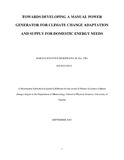| dc.contributor.author | Barasa, Ignatius Mukhwana | |
| dc.date.accessioned | 2014-07-10T13:52:51Z | |
| dc.date.available | 2014-07-10T13:52:51Z | |
| dc.date.issued | 2013 | |
| dc.identifier.citation | Master of science (climate change) | en_US |
| dc.identifier.uri | http://hdl.handle.net/11295/72544 | |
| dc.description.abstract | This study was aimed at developing an alternative green energy technology amongst households
in Bungoma South District, within Bungoma County. The households in the study area have
traditionally relied on kerosene as a source of energy to meet most of the domestic energy needs.
The main objective of this study was to develop a manual power generator that will solve
domestic energy and climate change challenges. Other specific objectives were to compare the
suitability of kerosene energy and energy from the Manual generator, determine the applicability
of green energy in the study area and establish if such a technology will meet the energy
demands for rural households.
In this research project, I developed qualitative and quantitative distinctions between kerosene
energy and green energy and showed that green energy is well placed to solve a myriad of health
and socio economic problems while at the same time reducing Green House Gases (GHG)
emissions. I also presented examples of green energy devices and compared them with kerosene
energy. The results showed that kerosene use had socio economic and environmental
consequences.
The study employed both primary and secondary data. The latter was collected from different
sources such as books and journals, while the former was achieved through key informants‘
interviews and questionnaire surveys. These methods generated both qualitative and quantitative
data that was analyzed using statistical packages.
Research findings indicated that the community under study was spending a lot of money on
purchase of kerosene. Health consequences were also been felt in addition to social impacts such
as loss of property due to accidental fire.
The study recommended the use of green energy as a substitute to the kerosene being used. In
addition, it emphasized the need to identify and develop innovations geared towards solving
environmental issues such as GHG emissions. | en_US |
| dc.language.iso | en | en_US |
| dc.publisher | University of Nairobi | en_US |
| dc.title | Towards developing a manual power generator for climate change adaptation and supply for domestic energy needs | en_US |
| dc.type | Thesis | en_US |
| dc.type.material | en_US | en_US |

